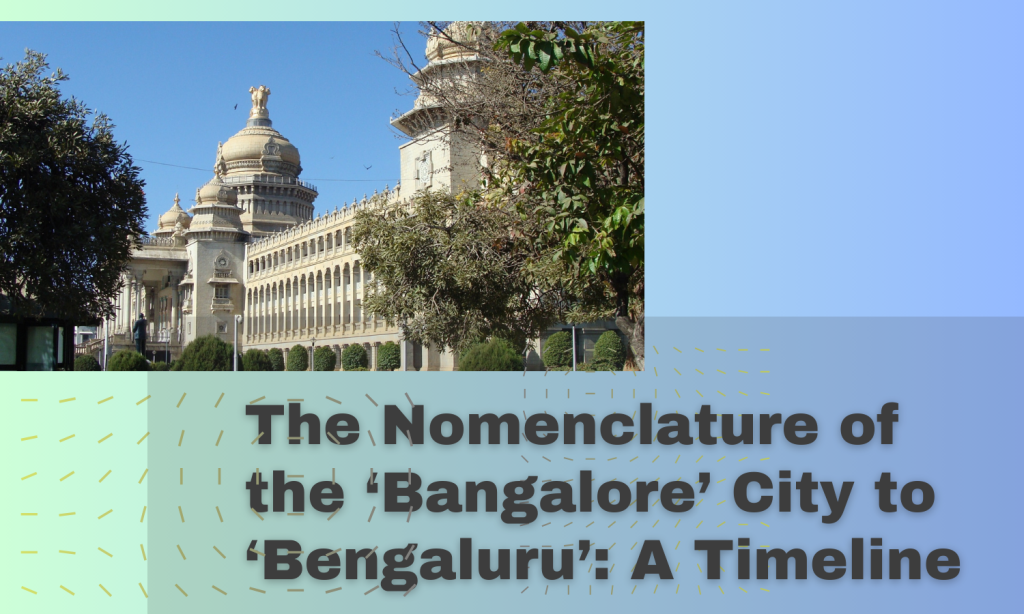If you’ve been following the news or are gearing up for your dream job in the public sector, you’ve likely come across a little linguistic puzzle: Bangalore or Bengaluru? Don’t worry; you’re not alone in this maze of city nomenclature!
In October 2014, you all must have heard this news. From now onwards, the capital city of Karnataka state, Bangalore, will be known as “Bengaluru”. Consequently, it took some time for all of us to accept and get used to the name Bengaluru. But there are still many of us that address the city as Bangalore instead of Bengaluru. The debate is still alive on whether it is ‘Bangalore’ or ‘Bengaluru’.
In this blog, we’re diving deep into the intriguing world of city names, starting with the evergreen debate of “Bangalore” versus “Bengaluru.” From the historical context to the cultural significance, we’ll uncover the layers that make these names more than just labels on a map. So, let’s embark on a conversational journey through the twists and turns of this language labyrinth!

First of all, let’s know about some of the aspects that contributed to this historical nomenclature of the city:
Factors that contributed to the nomenclature of Bangalore City
Historical Drama:
The naming saga of Bangalore to Bengaluru is rooted in history. Bangalore, under British colonial rule, earned its Anglicized name. The transformation to “Bengaluru” in 2014 aimed to restore its pre-colonial identity, harking back to the Kannada name “Bendakaluru.” This shift reflects a desire to reclaim the city’s history and shed its colonial vestiges.
Linguistic Twist:
The coexistence of “Bangalore” and “Bengaluru” showcases the intricate dance between languages. The English version persists due to its usage in English contexts, including official documentation and international communication. Meanwhile, “Bengaluru” thrives in the local Kannada language, emphasizing the importance of native linguistic expression.
Cultural Identity:
The transition to “Bengaluru” embodies a cultural revival. The name change symbolizes a deeper connection with Kannada heritage, emphasizing the city’s regional culture, literature, and traditions. It represents a conscious effort to align the city’s identity with its historical and cultural roots, asserting its distinctiveness.
In this city of dual identities, the historical, linguistic, and cultural dimensions intertwine, reflecting the complexity of urban nomenclature. This naming conundrum is more than semantics; it’s a mirror reflecting the dynamics of history, language, and cultural pride.
Origination of the Name “Bangalore”
During the British colonial period, the name “Bangalore” found its origins as a result of the interaction between British administrators and the local linguistic landscape. The transformation of the Kannada name “Bendakaluru” into “Bangalore” is attributed to the challenges the British encountered in pronouncing and transcribing the native name accurately.
As colonial influence spread across India, British officials aimed to establish administrative control over various regions. In doing so, they often anglicized local names to suit English phonetics and writing conventions. The British administration in Bangalore faced similar difficulties with the pronunciation and transcription of “Bendakaluru,” which is a complex word in the Kannada language.
To simplify matters and make the name more accessible to English speakers, the British gradually adapted “Bendakaluru” into “Bangalore.” This Anglicized version of the name not only suited the British colonial sensibilities but also facilitated communication and administration in English.
Thus, the transformation of “Bendakaluru” to “Bangalore” during the British colonial period illustrates the linguistic and administrative adaptations that frequently occurred as colonial powers encountered the diverse languages and cultures of the regions they governed.
Influence of the British Colonial Period in the Nomenclature of the name of the city ‘Bangalore’
The influence of British rule on the nomenclature of the city is a significant chapter in the evolution of its identity. The city we now know as Bengaluru has traversed a journey of renaming that reflects the historical complexities of colonialism. Under British rule, the city was transformed into a prominent administrative and military hub. This era marked the introduction of anglicized versions of local names, giving rise to the name “Bangalore.” The colonial administration’s penchant for simplification led to the truncation of native names, often disregarding their cultural and linguistic nuances.
However, as India gained independence and sought to reclaim its heritage, a renewed emphasis on indigenous nomenclature emerged. The name “Bengaluru” was reinstated to honor the city’s historical roots and cultural significance. This change symbolized a broader movement to shed the vestiges of colonial nomenclature and restore indigenous identities.
The debate between “Bangalore” and “Bengaluru” encapsulates the struggle between historical continuity and post-colonial resurgence. While “Bangalore” bears the mark of British influence, “Bengaluru” epitomizes the city’s indigenous heritage. Ultimately, the choice between the two names is not just a linguistic matter but a reflection of the broader societal and political aspirations to decolonize and reassert cultural autonomy. In the grand tapestry of India’s history, this nomenclature conundrum serves as a reminder of the enduring legacy of colonialism and the quest for self-representation.
Significance of the name ‘Bengaluru’ in the local Kannada language
“Bengaluru,” a name rooted in the local Kannada language, carries a deep significance that resonates with the city’s rich cultural heritage. Derived from the words “benda-kalu-ooru,” which translates to “town of boiled beans,” the name harkens back to a legendary tale of a humble meal offered by a kind old woman to a weary Hoysala king. This etymology showcases the city’s historical and vernacular origins, emphasizing its indigenous identity. “Bengaluru” encapsulates the local essence and symbolizes a departure from anglicized nomenclature, embodying a collective effort to restore linguistic authenticity and connect with the city’s past.

Historical Context and Rationale:
The renaming of Bengaluru by the Karnataka state government in 2014 marked a pivotal moment in the city’s history, aligning with a broader movement to revive indigenous names and shed colonial vestiges. This move sought to honor the city’s cultural roots, emphasizing its deep connection to the local Kannada language and heritage.
2005 – Early Calls for Change:
The seeds of the renaming initiative were sown in the mid-2000s when various cultural and linguistic groups began advocating for the restoration of traditional names across India. This growing sentiment gained momentum in Bengaluru, with discussions about reclaiming the city’s original name becoming more prominent.
2006 – Government Acknowledgment:
The Karnataka state government started acknowledging the demand for renaming the city in local parlance. The administration’s recognition of the need to honor Bengaluru’s heritage set the stage for future deliberations and actions.
2011 – Official Proposal and Public Feedback:
In 2011, the Karnataka government officially proposed renaming the city as “Bengaluru.” This announcement triggered a series of discussions, debates, and public feedback sessions involving citizens, linguistic experts, historians, and cultural enthusiasts.
2013 – Legislative Approval:
After careful consideration and extensive deliberation, the Karnataka Legislative Assembly passed a resolution in 2013 in favor of renaming the city. The decision was rooted in the belief that the change would not only honor the city’s past but also strengthen its cultural identity.
2014 – The Renaming Takes Effect:
On November 1, 2014, the city officially shed its colonial moniker “Bangalore” and adopted the name “Bengaluru.” This momentous step signaled the culmination of years of efforts and the triumph of local sentiments over the remnants of British influence.
Societal Impact and Continued Legacy:
The renaming of the city carried a profound societal impact, revitalizing a sense of pride in Bengaluru’s heritage. It became a testament to the power of language and identity, illustrating how a simple change in nomenclature could reaffirm cultural authenticity and restore historical connections.
The renaming of Bengaluru stands as a notable example of how a city’s name can encapsulate its history, culture, and aspirations. It reflects the significance of linguistic and cultural preservation and underscores the role of local communities in shaping the narrative of their own identity.
Influence of the Nomenclature of Bangalore in its Recognition, Branding and Communication
The transformation from “Bangalore” to “Bengaluru” has reverberated beyond local sentiment, impacting international recognition, branding, and communication. While the change reflects a commitment to cultural authenticity, it also poses challenges in terms of global familiarity. For international audiences, the new name demands a shift in recognition and communication strategies. However, this adjustment offers an opportunity to reshape the city’s branding narrative, emphasizing its deep-rooted heritage and forward-looking dynamism. The change serves as a reminder that names are not just labels; they are vessels of identity that influence how a place is perceived and remembered worldwide.
The Confusion that arises due to the dual adaptation of the City Name
The coexistence of “Bangalore” and “Bengaluru” in various contexts often leads to confusion. This duality arises from the transition between historical nomenclature and the newly adopted name. Locals and international audiences may grapple with selecting the appropriate name, impacting everything from official documentation to casual conversations. To mitigate this, clear communication and education are vital. Government bodies, businesses, and individuals must emphasize the use of “Bengaluru” in official and cultural contexts while acknowledging the historical reference of “Bangalore.” Over time, as the new name solidifies its place, the confusion will likely wane, allowing both the city’s past and its cultural resurgence to be harmoniously acknowledged.
Conclusion
In the intricate tapestry of city nomenclature, the debate between “Bangalore” and “Bengaluru” weaves a story of historical, linguistic, and cultural evolution. The shift from colonial-era “Bangalore” to the indigenous “Bengaluru” mirrors India’s journey from post-colonial resurgence to cultural revival. This linguistic labyrinth reflects the nation’s quest for identity, transcending mere semantics. Being a Government job aspirant, you should be well aware of the in-depth aspects that resulted in the nomenclature of Bangalore City. This will also help you in the general awareness section in any upcoming Government competitive exams. AlsoThe city’s essence persists whether addressed as “Bangalore” or “Bengaluru.” Let’s embrace the multifaceted dimensions underlying these names—a tribute to history, a celebration of heritage. Also, a reminder that names, though varied, reveal the unchanging soul of a place.















